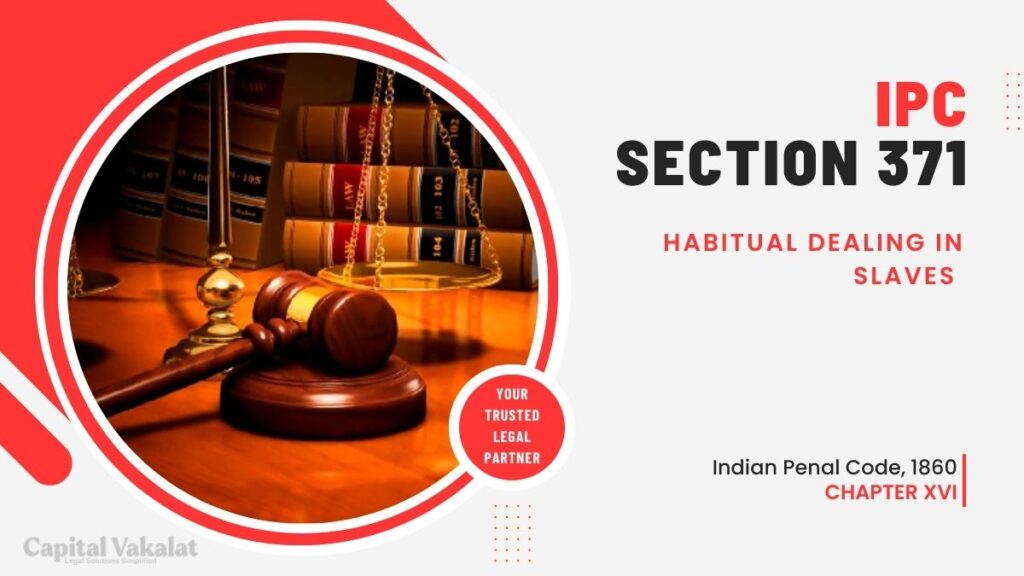The world has made significant strides in the fight against slavery, yet the shadows of this heinous practice persist in various forms. Section 371 of the Indian Penal Code (IPC) addresses the issue of habitual dealing in slaves, shedding light on the legal framework designed to combat this grave offense.

In a society that values freedom and human rights, understanding the nuances of laws such as Section 371 IPC becomes crucial. This article aims to delve into the intricacies of habitual dealing in slaves, examining its historical context, legal implications, challenges in enforcement, and the broader impact on society.
Understanding Section 371 IPC
Section 371 IPC serves as a pivotal element in the legal arsenal against slavery. It explicitly defines and criminalizes habitual dealing in slaves, reflecting the commitment of the legal system to eradicate this blight on humanity. This section stands as a testament to India’s dedication to upholding the principles of justice and equality.
Historical Context
To comprehend the gravity of Section 371 IPC, one must explore the historical evolution of laws against slavery. From ancient civilizations to the modern era, societies across the globe have grappled with the ethical and legal implications of human bondage. Understanding this context provides a foundation for appreciating the significance of contemporary legal frameworks.
In a global context, nations have collaborated to combat slavery through treaties and conventions. The collective effort to eradicate this practice reflects the shared commitment to human rights and dignity.
Elements of Section 371 IPC
Breaking down the components of Section 371 IPC is essential for a comprehensive understanding of its scope. The section encompasses a range of activities that constitute habitual dealing in slaves. From recruitment to transportation and exploitation, each element plays a crucial role in defining the offenses covered under this legal provision.
By examining these elements in detail, one can gain insight into the multifaceted nature of slavery-related crimes and the diverse situations that fall under the purview of Section 371 IPC.
Legal Consequences
The legal consequences of engaging in habitual dealing in slaves are severe, reflecting the gravity of the offense. Penalties and punishments outlined in Section 371 IPC aim to serve as a deterrent, sending a clear message that society will not tolerate such egregious violations of human rights.
Real-life case studies provide concrete examples of legal actions taken against individuals or entities involved in habitual dealing in slaves. These cases serve as cautionary tales, illustrating the impact of the law on those who perpetrate such crimes.
Challenges in Enforcement
While the legal framework is robust, enforcing anti-slavery laws poses considerable challenges. The clandestine nature of the activities covered under Section 371 IPC often makes detection and prosecution difficult. Loopholes in the legal system and inadequate resources further complicate efforts to root out this menace.
Addressing these challenges requires a multifaceted approach, involving collaboration between law enforcement agencies, legal experts, and advocacy groups. Identifying weaknesses in the enforcement process is the first step towards fortifying the legal system against habitual dealing in slaves.
Impact on Society
The implications of habitual dealing in slaves extend beyond legal consequences. This section explores the profound impact on individuals and communities. Real-life stories bring to light the human cost of slavery, emphasizing the urgent need to eradicate this practice.
Examining the social ramifications of slavery underscores the interconnectedness of legal, ethical, and societal considerations. As a society, acknowledging the collective responsibility to protect the vulnerable is essential for fostering positive change.
International Efforts Against Slavery
The fight against slavery transcends national borders. International initiatives and collaborations play a crucial role in creating a unified front against habitual dealing in slaves. Treaties and agreements facilitate information exchange, coordination, and mutual support among nations committed to eradicating slavery.
Understanding the global landscape of anti-slavery efforts provides context for India’s role in this collective endeavor. By contributing to international initiatives, the nation reinforces its commitment to human rights on the global stage.
Raising Awareness
Preventing habitual dealing in slaves requires more than legal measures alone. Education and awareness play a pivotal role in empowering individuals to recognize and combat slavery. Grassroots movements, supported by educational programs, contribute to a societal shift that condemns such practices unequivocally.
Through analogies and metaphors, the article emphasizes the power of knowledge in dismantling the chains of slavery. By fostering a collective sense of responsibility, communities can actively contribute to the eradication of this heinous crime.
Conclusion
In conclusion, Section 371 IPC stands as a beacon of justice in the fight against habitual dealing in slaves. This article has explored the legal, historical, and societal dimensions of this provision, underscoring its significance in the broader context of human rights. As a society, it is our collective responsibility to remain vigilant, educate ourselves and others, and actively contribute to the ongoing battle against slavery.
Frequently Asked Questions
How can individuals contribute to the fight against slavery?
Individuals can contribute by raising awareness, supporting anti-slavery organizations, and staying informed about ethical consumer choices.
What are the challenges in prosecuting cases under Section 371 IPC?
Challenges include the covert nature of the crime, difficulty in obtaining evidence, and the need for international cooperation in cross-border cases.
How does international collaboration impact the effectiveness of anti-slavery efforts?
International collaboration enhances information sharing, joint investigations, and coordinated efforts to combat the global dimensions of slavery.
What role does education play in preventing habitual dealing in slaves?
Education is a powerful tool in preventing slavery by creating awareness, empowering communities, and fostering a culture that rejects exploitation.